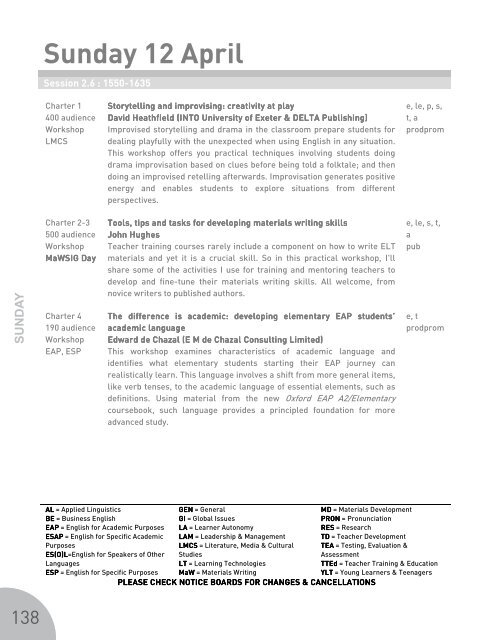You also want an ePaper? Increase the reach of your titles
YUMPU automatically turns print PDFs into web optimized ePapers that Google loves.
Sunday 12 April<br />
Session 2.6 : 1550-1635<br />
Charter 1<br />
400 audience<br />
Workshop<br />
LMCS<br />
Storytelling and improvising: creativity at play<br />
David Heathfield (INTO University of Exeter & DELTA Publishing)<br />
Improvised storytelling and drama in the classroom prepare students for<br />
dealing playfully with the unexpected when using English in any situation.<br />
This workshop offers you practical techniques involving students doing<br />
drama improvisation based on clues before being told a folktale; and then<br />
doing an improvised retelling afterwards. Improvisation generates positive<br />
energy and enables students to explore situations from different<br />
perspectives.<br />
e, le, p, s,<br />
t, a<br />
prodprom<br />
SUNDAY<br />
Charter 2-3<br />
500 audience<br />
Workshop<br />
MaWSIG Day<br />
Charter 4<br />
190 audience<br />
Workshop<br />
EAP, ESP<br />
Tools, tips and tasks for developing materials writing skills<br />
John Hughes<br />
Teacher training courses rarely include a component on how to write ELT<br />
materials and yet it is a crucial skill. So in this practical workshop, I'll<br />
share some of the activities I use for training and mentoring teachers to<br />
develop and fine-tune their materials writing skills. All welcome, from<br />
novice writers to published authors.<br />
The difference is academic: developing elementary EAP students’<br />
academic language<br />
Edward de Chazal (E M de Chazal Consulting Limited)<br />
This workshop examines characteristics of academic language and<br />
identifies what elementary students starting their EAP journey can<br />
realistically learn. This language involves a shift from more general items,<br />
like verb tenses, to the academic language of essential elements, such as<br />
definitions. Using material from the new Oxford EAP A2/Elementary<br />
coursebook, such language provides a principled foundation for more<br />
advanced study.<br />
e, le, s, t,<br />
a<br />
pub<br />
e, t<br />
prodprom<br />
AL = Applied Linguistics<br />
BE = Business English<br />
EAP = English for Academic Purposes<br />
ESAP = English for Specific Academic<br />
Purposes<br />
ES(O)L=English for Speakers of Other<br />
Languages<br />
ESP = English for Specific Purposes<br />
GEN = General<br />
GI = Global Issues<br />
LA = Learner Autonomy<br />
LAM = Leadership & Management<br />
LMCS = Literature, Media & Cultural<br />
Studies<br />
LT = Learning Technologies<br />
MaW = Materials Writing<br />
MD = Materials Development<br />
PRON = Pronunciation<br />
RES = Research<br />
TD = Teacher Development<br />
TEA = Testing, Evaluation &<br />
Assessment<br />
TTEd = Teacher Training & Education<br />
YLT = Young Learners & Teenagers<br />
PLEASE CHECK NOTICE BOARDS FOR CHANGES & CANCELLATIONS<br />
138


